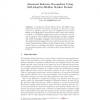235 search results - page 17 / 47 » Test Generation Based on Symbolic Specifications |
ICIAR
2009
Springer
14 years 2 months ago
2009
Springer
A self-adaptive Hidden Markov Model (SA-HMM) based framework is proposed for behavior recognition in this paper. In this model, if an unknown sequence cannot be classified into an...
GECCO
2010
Springer
14 years 1 months ago
2010
Springer
We use affine arithmetic to improve both the performance and the robustness of genetic programming for symbolic regression. During evolution, we use affine arithmetic to analyze e...
ATVA
2007
Springer
14 years 4 months ago
2007
Springer
Fault tree analysis is a traditional and well-established technique for analyzing system design and robustness. Its purpose is to identify sets of basic events, called cut sets, wh...
EURODAC
1994
IEEE
14 years 1 months ago
1994
IEEE
This paper presents a testability improvement method for digital systems described in VHDL behavioral specification. The method is based on testability analysis at registertransfe...
COMPSAC
2008
IEEE
14 years 4 months ago
2008
IEEE
Path-oriented Random Testing (PRT) aims at generating a uniformly spread out sequence of random test data that activate a single control flow path within an imperative program. T...

